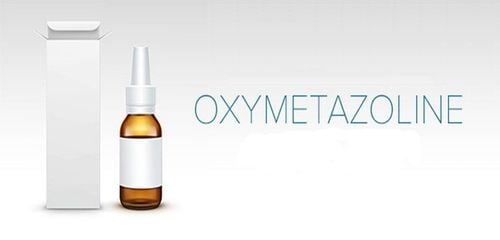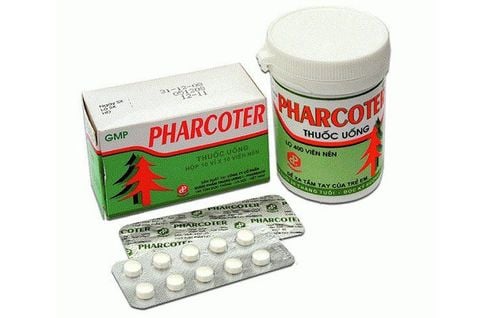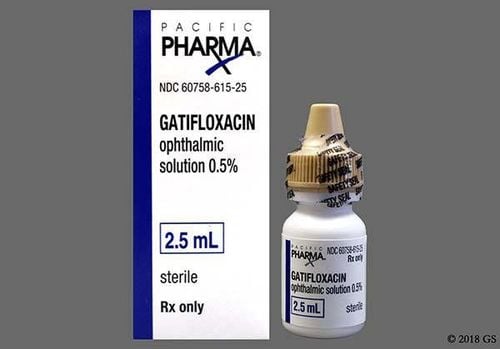This is an automatically translated article.
Thémaxtene is a brand name drug with Alimemazine ingredient, used to treat respiratory and skin allergy symptoms such as sneezing, runny nose, itching and urticaria.
1. What is Thémaxtene?
Thémaxtene contains the active ingredient Alimemazine, a derivative of phenothiazines, which is an antihistamine. It works by blocking histamine in the body. Thémaxtene is available as a film-coated tablet. Each Thémaxtene tablet contains 5mg of Alimemazine tartrate.
Thémaxtene (Alimemazine) is rapidly absorbed from the gastrointestinal tract. Thémaxtene drug takes effect after about 15-20 minutes and lasts 6-8 hours. The proportion of Alimemazine bound to plasma proteins is 20-30%, the half-life of Alimemazine is 3.5-4 hours. Alimemazine is eliminated by the kidneys after 48 hours with 70-80% eliminated as sulfoxide metabolites.
2. What are the effects of thémaxtene?
Thémaxtene has strong anti-histamine and anti-serotonin effects. In addition, Thémaxtene also has sedative, antiemetic and cough suppressant effects.
Alimemazine competes with histamine at the histamine H1 receptor, so the drug Thémaxtene has an H1 antihistamine effect. The drug antagonizes most of the pharmacological effects of histamine such as: urticaria, itching. The peripheral anticholinergic effect of Thémaxtene is relatively weak, however, some cases of Alimemazine use manifest blurred vision, dry mouth or constipation. Thémaxtene can be used as a sedative by inhibiting the enzyme histamine N-methyltransferase, blocking central histamine-secreting receptors along with effects on other receptors, including serotoninergic receptors. That is the basis on which Alimemazine is also used as a pre-anesthetic drug. Thémaxtene also has an antiemetic effect. The mechanism of this action is unknown, possibly due to the direct action of the drug on the chemosensitive mediastinum in the spinal cord, blocking dopaminergic receptors in this region.
3. Designation
With the above effects, Thémaxtene is indicated in the following cases:
Treatment of allergy symptoms: Respiratory allergies (sneezing, runny nose, rhinitis), skin allergies (itching, urticaria), conjunctivitis. Vomiting frequently in children. Insomnia occurs in children or insomnia in adults. Dry cough, cough due to irritation, especially dry cough a lot at night. Acute delirium comes from alcohol withdrawal.
4. Dosage, usage
Thémaxtene is administered orally, with dosage depending on the purpose of treatment as well as the subject being treated.
Urticaria, itchy papules:
Adults: 10mg/time x 2-3 times/day, the highest dose is usually not more than 100mg/day. Elderly people: 10mg/time x 1-2 times/day. Children 2 years and older: 2.5 - 5mg x 3 - 4 times/day. Supportive treatment of insomnia: Take Thémaxtene once before bedtime, with different doses for adults and children:
Adults: 5 -20mg/day Children: 0.25 - 0.5mg/kg/day. Antihistamine, antitussive:
Adults: 5-40mg/day Children: 0.5-1mg/kg/day, divided into several times. Acute delirium: Dose of 50 - 200mg/day for adults
5. Contraindications
Contraindicated to use Thémaxtene in the following cases:
Hypersensitivity to Alimemazine or to other antihistamines. Liver dysfunction Renal dysfunction. Epilepsy, Parkinson's, myasthenia gravis. Thyroid deficiency. Pheochromocytoma. History of granulocytosis - associated with phenothiazine derivatives. Risk of urinary retention due to disorders in the urethra, prostate. Risk of angle-closure Glaucoma. Children under 6 years of age Pregnant and lactating women Overdose due to barbiturates, opiates, alcohol
6. Drug interactions
Alcohol, barbituric hypnotics or other sedatives increase the CNS depressant effect of Thémaxtene, and also inhibit respiration. When combined with Thémaxtene - another phenothiazine derivative with antihypertensive drugs, especially alpha-adrenergic receptor blockers, will increase the antihypertensive effect of these drugs. When Thémaxtene is combined with other anticholinergic drugs, it will increase the anticholinergic effect of phenothiazines, leading to constipation, heatstroke. Thémaxtene as well as other phenothiazines antagonize the therapeutic effects of amphetamine, levodopa, clonidine, guanethidine, adrenaline. Antacids, Parkinson's drugs, lithium prevent the absorption of phenothiazines, including Thémaxtene. High doses of Alimemazine interact with decreased response to hypoglycemic agents. When phenothiazines are combined with levodopa, the anti-Parkinsonian effects of levodopa may be inhibited. To avoid interactions, before being prescribed Thémaxtene, patients should inform their doctor about all the drugs they are using, including dietary supplements. The doctor will base on that to prescribe the appropriate Thémaxtene.
7. Side effects
Depending on the dose, duration of use as well as the indication for treatment that patients taking Thémaxtene may experience some unwanted effects.
Common: The manifestations of fatigue, lethargy, dizziness, headache are common side effects when treated with Thémaxtene. In addition, patients may also present symptoms of dry mouth, thick sputum. Uncommon: Constipation, urinary retention or ocular dysregulation are less common side effects in people taking Thémaxtene. Rare: Leukopenia, increased heart rate, hypotension, hepatitis, obstructive jaundice, extrapyramidal symptoms, parkinsonian tremor, acute dystonia, restlessness, dry mouth, risk of respiratory arrest , even sudden death has been reported in young children. If you experience these symptoms, the patient should stop using Thémaxtene and notify the doctor for appropriate treatment.
8. Caution
Thémaxtene should be used with caution in elderly patients, especially when it is too hot or too cold because it can cause orthostatic hypotension, dizziness or somnolence and constipation). Thémaxtene should be used with caution in cardiovascular patients. Thémaxtene should be avoided in pregnant women and Thémaxtene should not be used in lactating women. Because of its sedative effect, causing drowsiness, extreme caution should be exercised when Thémaxtene is used in people who are driving or operating machinery. Above is the entire information about the drug Thémaxtene, patients need to carefully read the instructions for use, consult a doctor / pharmacist before using. Absolutely do not arbitrarily buy the drug Thémaxtene treatment at home because there may be unwanted side effects.













